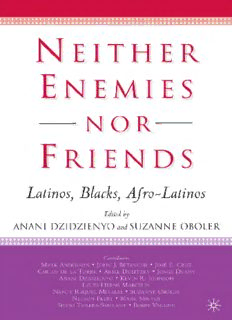
Neither Enemies nor Friends: Latinos, Blacks, Afro-Latinos PDF
Preview Neither Enemies nor Friends: Latinos, Blacks, Afro-Latinos
01-Dzid_Fm.qxd 19/2/05 10:38 AM Page i Neither Enemies nor Friends This page intentionally left blank 01-Dzid_Fm.qxd 19/2/05 10:38 AM Page iii Neither Enemies nor Friends Latinos, Blacks, Afro-Latinos Edited by Anani Dzidzienyo and Suzanne Oboler 01-Dzid_Fm.qxd 19/2/05 10:38 AM Page iv NEITHERENEMIESNORFRIENDS © Anani Dzidzienyo and Suzanne Oboler,2005. All rights reserved.No part of this book may be used or reproduced in any manner whatsoever without written permission except in the case of brief quotations embodied in critical articles or reviews. First published in 2005 by PALGRAVE MACMILLAN™ 175 Fifth Avenue,New York,NY 10010 and Houndmills,Basingstoke,Hampshire,England RG21 6XS Companies and representatives throughout the world. PALGRAVE MACMILLAN is the global academic imprint of the PalgraveMacmillan division of St.Martin’s Press LLC and of Palgrave Macmillan Ltd.Macmillan® is a registered trademark in the United States,United Kingdom,and other countries. Palgrave is a registered trademark in the European Union and other countries. ISBN 1–4039–6567–6 hardback ISBN 1–4039–6568–4 paperback Library of Congress Cataloging-in-Publication Data Neither enemies nor friends :Latinos,Blacks,Afro Latinos / edited by Anani Dzidzienyo and Suzanne Oboler. p.cm. Includes bibliographical references and index. ISBN 1–4039–6567–6 (cloth)—ISBN 1–4039–6568–4 (pbk.) 1.America—Race relations.2.Latin America—Race relations.3.United States—Race relations.4.Racism—Political aspects—America.5.Racism—political aspects—Latin America.6.Racism—Political aspects—United States.7.African Americans—Relations with Hispanic Americans.8.African Americans—Race identity. 9.Hispanic Americans—Race identity.10.Ethnicity—America.I.Dzidzienyo,Anani, 1941– II.Oboler,Suzanne. E29.A1N45 2004 308.8(cid:2)0097—dc22 2004052797 A catalogue record for this book is available from the British Library. Design by Newgen Imaging Systems (P) Ltd.,Chennai,India. First edition:March 2005 10 9 8 7 6 5 4 3 2 1 Printed in the United States of America. 01-Dzid_Fm.qxd 19/2/05 10:38 AM Page v Contents art 1 P omparative acialization in the mericas C R A 1 1. Flows and Counterflows: Latinas/os, Blackness, and Racialization in Hemispheric Perspective 3 Suzanne Oboler and Anani Dzidzienyo art 2 P he olitics of acialization in atin merica T P R L A 37 2. A Region in Denial: Racial Discrimination and Racism in Latin America 39 Ariel E. Dulitzky 3. Afro-Ecuadorian Responses to Racism: Between Citizenship and Corporatism 61 Carlos de la Torre 4. The Foreignness of Racism: Pride and Prejudice Among Peru’s Limeños in the 1990s 75 Suzanne Oboler 5. Bad Boys and Peaceful Garifuna: Transnational Encounters Between Racial Stereotypes of Honduras and the United States (and Their Implications for the Study of Race in the Americas) 101 Mark Anderson 6. Afro-Mexico: Blacks, Indígenas, Politics, and the Greater Diaspora 117 Bobby Vaughn 7. The Changing World of Brazilian Race Relations? 137 Anani Dzidzienyo art 3 P he olitics of acialization in the nited tates T P R U S 157 8. Framing the Discussion of African American–Latino Relations: A Review and Analysis 159 John J. Betancur 01-Dzid_Fm.qxd 19/2/05 10:38 AM Page vi vi/ contents 9. Neither White nor Black: The Representation of Racial Identity Among Puerto Ricans on the Island and in the U.S. Mainland 173 Jorge Duany 10. Scripting Race, Finding Place: African Americans, Afro-Cubans, and the Diasporic Imaginary in the United States 189 Nancy Raquel Mirabal 11. Identity, Power, and Socioracial Hierarchies Among Haitian Immigrants inFlorida 209 Louis Herns Marcelin 12. Interminority Relations in Legislative Settings: The Case of African Americans and Latinos 229 José E. Cruz 13. African American and Latina/o Cooperation in Challenging Racial Profiling 247 Kevin R. Johnson 14. Racial Politics in Multiethnic America: Black and Latina/o Identities and Coalitions 265 Mark Sawyer 15. Racism in the Americas and the Latino Scholar 281 Silvio Torres-Saillant Appendix Witnessing History: An Octogenarian Reflects on Fifty Years of African American–Latino Relations 305 Nelson Peery Notes on the Contributors 313 Index 317 02-Dzid_01.qxd 19/2/05 10:38 AM Page 1 Part 1 Comparative Racialization in the Americas This page intentionally left blank 02-Dzid_01.qxd 19/2/05 10:38 AM Page 3 Chapter 1 Flows and Counterflows: Latinas/os, Blackness, and Racialization in Hemispheric Perspective1 Suzanne Oboler and Anani Dzidzienyo In a country of slaves, there are neither political enemies nor friends: there are some wise people who do business and an enormous mass that wants nothing other than to obey. Moreover, there are whites, Blacks, and mulattos who must continue living together. And that, in the final analy- sis, is this country’s only difficulty. —Baroness E. de Langsdorff, Brazil, 1842–18432 Who are the Afro–Latin Americans?3What historical contributions do they bring to their respective national polities? What is the nature of their identity? What happens to their identities as a result of migration to the United States? What do we know of the experience of the second and subsequent generations of Afro–Latin American immigrants categorized under the current social labels as “Afro-Latinas/os” in the United States? What is the impact of their growing presence within Latina/o popu- lations, particularly with respect to the dynamics of race relations in the United States today? And, more generally, what are the possible goals, the prospects, and obstacles for coalition building between and among racial(ized) minorities and other groups in U.S. society today? These are some of the key questions guiding the articles in this anthology, the purpose of which is twofold: on the one hand, to examine the contemporary construction and meanings attributed to blackness in the Americas; and, on the other, to acknowledge the role of population movements, specifically of Black and other nonwhite peoples such as Native Americans and Asian Americans within the hemisphere, in reshaping the ways we think about color and phenotype, as well as racialization—a term that, as defined by Darder and Torres (2003:315), alludes to “the use of ‘race’ in structuring social relations” in the United States today.4 The following pages provide a brief rationale for this volume and serve to frame the essays we have included in our anthology. We begin by proposing a transnational framework for situating the parallel origins and development of racialization in the hemisphere. Recognizing the impact of the growing circular migration of people of Latin American descent, we briefly outline some of the commonalities and
Description: